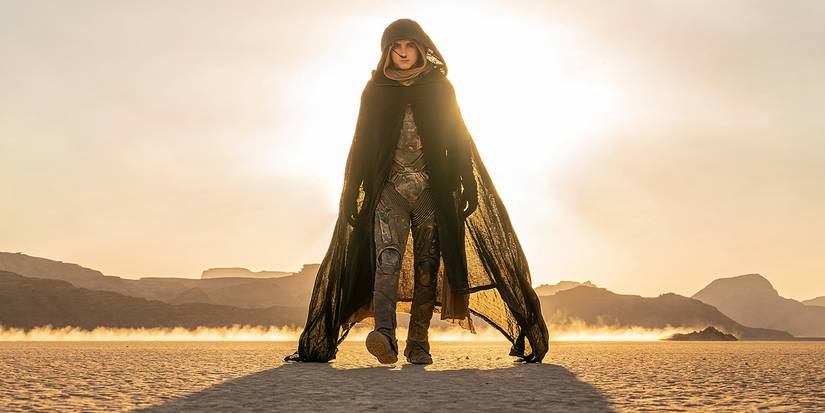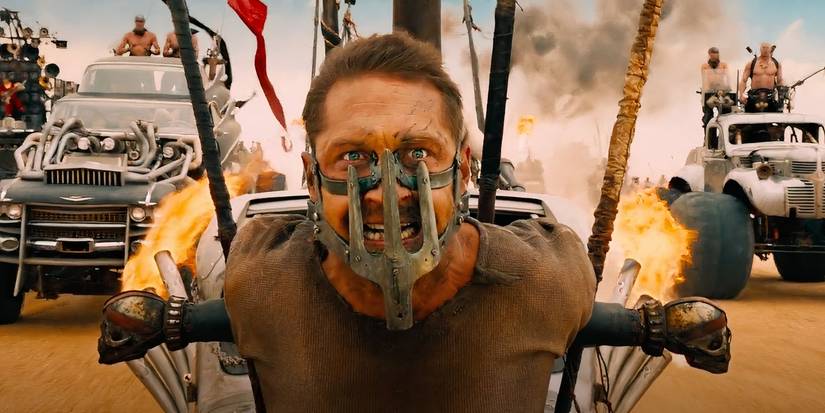
10 Greatest Soft Sci-Fi Movies of the 21st Century, Ranked
Soft science fiction is a genre term that, appropriately, has no hard rules to define it. It’s been used to loosely categorize those works of fiction that are the opposite of hard science fiction, which itself is defined by its adherence to the science half of its name, with increased focus on the technology that is integral to its plot. Soft sci-fi, by contrast, has no interest in explaining its science and only uses it as a means to an end to tell its story and instead places the focus solely on the characters: their emotions, dynamics, and psychology.
By that definition, the vast majority of science fiction movies could be reasonably categorized as soft sci-fi, but there are those that seem to fit the bill a little better than others by their complete and utter disinterest in the technology displayed on screen. These are movies where spaceships come complete with artificial gravity, time travel is accessible to the average Joe, and the apocalypse has plenty of gasoline to race cars with. The 21st century has seen plenty of these movies hit theaters, and even more in the age of streaming, and these soft sci-fi movies are the best of the bunch.
10
‘Guardians of the Galaxy’ (2014)
Spacefaring adventures have been one of the most popular forms of soft sci-fi since even before George Lucas introduced audiences to a galaxy far, far away. In the 21st Century, beyond the Star Wars fantasies, there have been space Westerns like Serenity, space pirates in Treasure Planet, and the rebooted voyages of Starfleet in 2009’s Star Trek. All fun romps in their own right, but if there’s one that fully embraces the fun of space travel, it’s the very first Guardians of the Galaxy. Coming from the mind of James Gunn and based on C-list Marvel characters that most mainstream movie-goers had never heard of, this slapstick space opera was one of the first real tests of the MCU’s ability to draw in an audience.
Not surprisingly, the movie was a huge hit, but slightly more surprising was how damn good it was. While Gunn is now a big name in superhero cinema, he had only directed two cult movies when he was tapped by Kevin Feige to helm the first cosmic MCU movie. His penchant for irreverent humor suited the story of a ragtag group of intergalactic criminals banding together to reluctantly save the galaxy, and the casting was immaculate as well. While Zoe Saldaña had already proven her sci-fi bona fides with Avatar and Star Trek, the rest of the crew were either untested or considered left-field choices. Bradley Cooper turned out to be inspired casting as Rocket Raccoon, and Vin Diesel as Groot proved the actor is best when given as minimal dialogue as possible. Add star-making turns by Chris Pratt and Dave Bautista, and Guardians of the Galaxy turned into one brightly colored blast across the stars.
9
‘Her’ (2013)
Romancing a sultry-voiced A.I. doesn’t even seem like science fiction nowadays, as artificial intelligence continues to creep further and further into the daily lives of most first-world citizens. That only makes Spike Jonze‘s Her all the more relevant to the current moment, especially since the movie is set in what was then the near future of 2025. The technology that makes Samantha, the intelligent operating system voiced by Scarlett Johansson, whom Joaquin Phoenix‘s Theodore falls for, work wasn’t all that far-fetched in 2013. The chatbots currently available to the average consumer today don’t quite measure up to her capabilities, but the ways in which Jonze envisioned a more subtle future where A.I. isn’t some power-hungry killing machine feel all the more palpable.
Her is far less concerned with the implications of artificial intelligence than it is with the ways in which humans bond and form relationships, and how difficult and alien that process can be for some. In the 21st century, where technology has been able to automate so many things for humans, it would only seem natural to some that romance would eventually follow suit. The film never judges its protagonist for wanting to form a genuine connection with an operating system, but merely observes how heartbreaking it is. For a film about a romance where one half of it is made up of cold circuitry and data, Her has a lot of genuine emotion.
8
‘Snowpiercer’ (2013)
If it seems unlikely that the remnants of humanity in a climate-induced apocalyptic ice age would survive on a massive train encircling the globe that’s been divided into sections based on class status, then Snowpiercer is the perfect litmus test for anyone wondering if they prefer hard or soft sci-fi. Based on a French graphic novel and directed by Bong Joon Ho, this post-apocalyptic film continues the filmmaker’s tendency to deftly blend genres and explore social themes amidst outrageous action and violence. Chris Evans stars as the leader of a lower-class rebellion that battles its way from the caboose to the head of the train, and the film delivers spectacle and satire in equal measure as they do.
Snowpiercer’s incredible production design evolves as the plot literally pushes forward, going from the oily, grungy aesthetic of the lower class to the pristine high-tech world of the upper class. It’s a stark and infuriating visual representation of class warfare that never overwhelms or halts the narrative momentum. Evans makes for a convincingly jaded hero who has some seriously dark secrets lurking in his past, while Tilda Swinton adds to her menagerie of idiosyncratic characters as a villain whose appearance was based on a compilation of real-life fascists and compounded with a thick Yorkshire accent. Bong’s uncut vision eventually reached audiences, who responded strongly to its uncompromising, genre-bending, sci-fi thrills.
7
‘The Prestige’ (2006)
While its Victorian London setting and plot of an escalating feud between two magicians might not suggest science fiction, Christopher Nolan‘s adaptation of Christopher Priest‘s novel The Prestige belies its secret sci-fi status the same as the misdirect in a magic act. Christian Bale and Hugh Jackman make for perfect foils of each other in performances that mirror their star personas, with Bale as the meticulously dedicated performer and Jackman the greatest showman. As the two trade off sabotaging each other’s performances, they also attempt to perfect the same trick, which leads Jackman to the famous inventor Nikola Tesla, played by David Bowie, who injects science fiction technology directly into the film.
As handsomely produced and intricately plotted as any of Nolan’s films, The Prestige remains underrated in his filmography despite being one of the most successful executions of his marriage of material with story structure. The film plays out in the fictional formation of a magic trick: setup, performance and prestige. While the sci-fi elements introduce a new and unexpected element to the story, it’s the plot twist regarding Bale’s character that is the true magic trick of the film, expertly seeded and presented to the audience in plain sight, before being brilliantly revealed. The Prestige is Nolan as a master magician.
6
‘Under the Skin’ (2013)
As low-fi and stripped-down an alien film as there has ever been, Jonathan Glazer‘s Under the Skin uses an extra-terrestrial point of view to examine the human condition. Scarlett Johansson plays an alien who wanders Glasgow, picking up unsuspecting men and luring them into a dark void as part of some vaguely explained experimentation. Sexuality and gender dynamics are all explored as she continues to prowl for potential victims, made all the more unnervingly natural by the fact that several scenes were shot completely unscripted, with Johansson’s ability to lure non-actors captured on hidden cameras.
Under the Skin does exactly as its title implies, as it crawls under the flesh of viewers and forces them to consider its nebulous plot without any grander explanation. From Johansson’s completely ego-less performance to the discombobulating imagery and the shocking sequences of callous death, the film offers no easy explanations or recognizable genre trappings for the audience to hold on to. It simply exists in its unsettling sci-fi world and lets viewers make what they will of it on their own.
5
‘Dune: Part Two’ (2024)
Denis Villeneuve has become possibly the most preeminent director of soft sci-fi in the 21st century. From Arrival to Blade Runner 2049, he has been delivering consistently great work within the genre, but if there’s one film of his that best exemplifies his sensibilities as well as those of soft science fiction, it’s the second part of his Dune saga. It continues the story of Paul Atreides as he unites the Fremen tribes of the desert planet Arrakis and escalates his war with the antagonistic House Harkonnen. The epic sequel evolves the themes begun in the first film and elevates the action and visuals to new heights, creating a massive sci-fi spectacle that dwarfs most of its blockbuster competition.
Author Frank Herbert‘s sprawling Dune narrative is a landmark in the soft sci-fi genre, foregoing most of its focus on technology in favor of human elements, including political and religious themes. That focus is translated directly over into Villeneuve’s two films that adapted the first novel, with an added emphasis on the arc of Timothée Chalamet as Paul Atreides and his eventual ascendance to a messiah figure. It’s epic sci-fi storytelling accomplished at the highest level of Hollywood filmmaking, layering incredible technical artistry over a soulful narrative core.
4
‘WALL-E’ (2008)
For all the human romances present in soft sci-fi narratives, there may be no romantic plight more genuinely heartfelt than that of a lonely garbage-collecting robot. WALL-E is director Andrew Stanton‘s animated masterpiece, blending an apocalyptic future setting with a sentimental love story that all sits atop a gentle rebuke of consumerism and a plea for environmental conservation. The first act of this truly gorgeous film may be the finest work Pixar has ever done, and while the later sections of the film can’t match that quiet whimsy, it is still a thought-provoking and emotionally moving experience as a whole.
The true magic of WALL-E as a character comes from the aural artistry of Ben Burtt — also responsible for the sounds behind R2-D2 — who finds a soul inside the digital machinery of the character in one of the most adorable robot voices ever put on film. It is impossible not to fall in love with the little garbage-crushing bot, and it’s his infectious spirit that makes the movie such an inspiring watch despite its otherwise cynical outlook on the future of humanity. It was the Academy Awards’ failure to recognize WALL-E in their most major category, along with The Dark Knight, that led to the expansion of the Best Picture nominees to allow room for more populist fare and animated movies, which had been overlooked for far too long.
3
‘Eternal Sunshine of the Spotless Mind’ (2004)
Almost everyone has moments in their life they would just as soon have permanently erased from their memory, but barring a traumatic head injury, late-stage dementia or a frontal lobotomy, that isn’t an option. But in the sci-fi world created by writer Charlie Kaufman and director Michel Gondry in Eternal Sunshine of the Spotless Mind, selective memory erasure is a viable and safe procedure with the only collateral damage being the heartbroken partners left behind. That’s how Jim Carrey‘s Joel feels when he discovers that his ex, Clementine, played by Kate Winslet, has had all traces of him scrubbed from her mind, leading him to decide to have the procedure done as well.
Naturally, as anyone who’s ever gone through a break-up eventually realizes, Joel comes to regret his decision and recognizes that he would rather keep his memories of her. Between Kaufman’s clever script, Gondry’s sharp visuals, which emphasized many practical effects over digital, and the uniformly terrific cast, Eternal Sunshine is one of the most original, audacious and genuinely affecting sci-fi films of the 21st century. It’s a perfect vehicle for both Carrey and Winslet, who both get to explore different character territory not afforded by their previous roles, with Carrey in a far more subdued and poignant mode and Winslet with an anarchistic spirit that covers up her deep insecurities. It all makes for one of the best uses of science fiction to explore the deep intricacies of modern relationships.
2
‘Mad Max: Fury Road’ (2015)
Coming after a decades-long break from the post-apocalyptic franchise that jump-started his directorial career, George Miller returned to the barren landscape of the Mad Max franchise with the most explosive action film of the 21st century. Stripping the action-heavy engine of the film series down to its bare essentials, Fury Road takes the third act of The Road Warrior and extends it into one feature-length car chase across the desert. With a new Max played with grumbling grit by Tom Hardy and a new lead in Charlize Theron‘s Furiosa, this franchise reset kicks the action into high gear at the outset and hardly ever lets its foot off the gas.
From the sun-baked visuals to the incredible stunt work and brilliant visual storytelling, Miller has elevated every aspect of his signature film series, and he handles its visceral action with more skill than directors half his age. The Mad Max films have always operated on their internal logic and distinct aesthetic that has both influenced an entire subgenre of post-apocalyptic films and continually evolved with each entry. Fury Road is the apex of that evolution, soft sci-fi that goes incredibly hard.
1
‘Children of Men’ (2006)
Coming in the wake of 9/11 and made while the Iraq War was still causing mass casualties, Alfonso Cuarón‘s Children of Men adapts the novel by P.D. James, set in a dystopic future where humanity can no longer procreate, downplaying its overt Christian themes for a modern exploration of the refugee experience. Told in a visceral style through hectic camerawork, the film’s action sequences service a human story that hits even harder when compared to the militaristic efforts of America’s current administration toward its immigrant population.
Clive Owen gives haggard life to Theo, a former activist turned apathetic, who finds himself drawn back into the fight when his estranged wife asks for his help in transporting the world’s first pregnant woman in decades to safety. Filled with harrowing imagery that echoes historical events from war-torn countries and continues to feel relevant and cautionary, Children of Men is a dystopic sci-fi thriller that perfectly synthesizes Cuarón’s humanistic storytelling and stylish visuals. Few sci-fi films from the 21st century or before are as harshly affecting or as memorably visceral.












